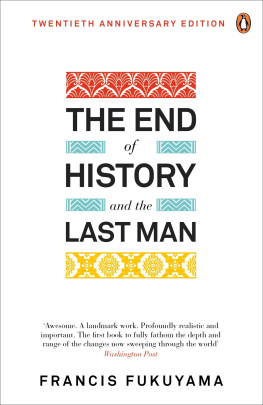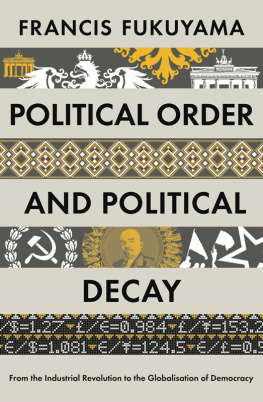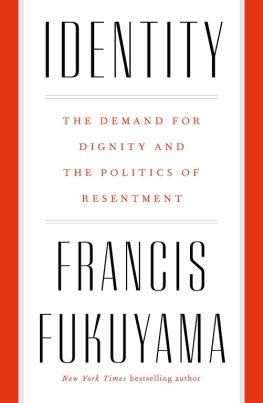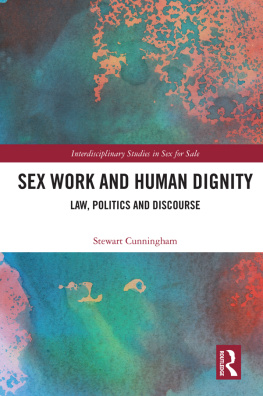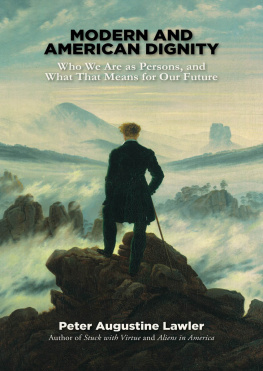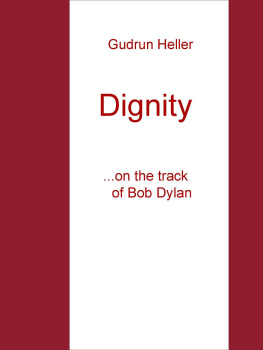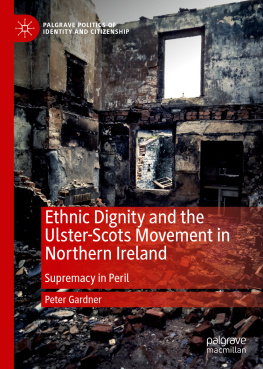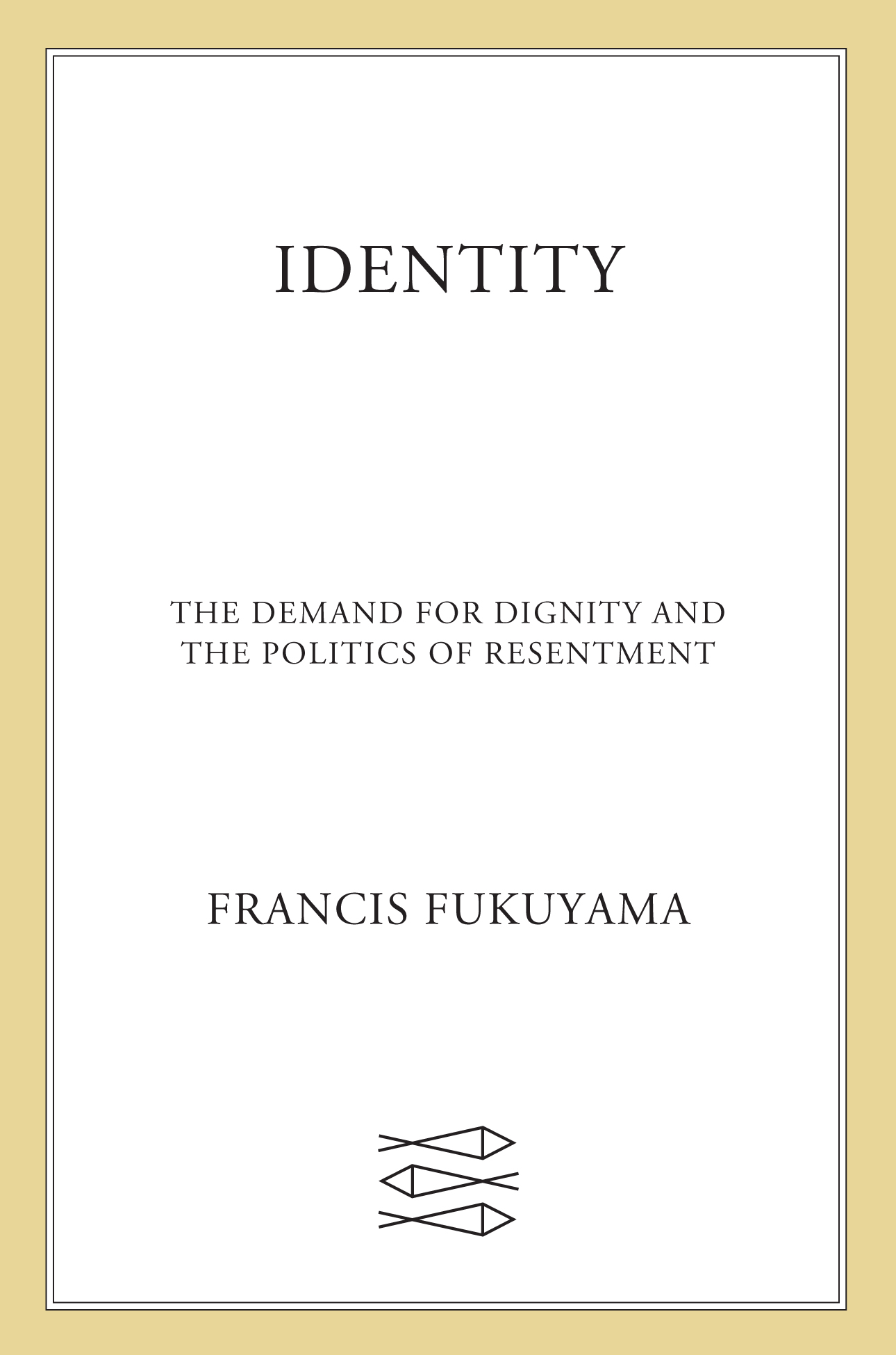Contents
Guide
Pagebreaks of the print version

The author and publisher have provided this e-book to you for your personal use only. You may not make this e-book publicly available in any way. Copyright infringement is against the law. If you believe the copy of this e-book you are reading infringes on the authors copyright, please notify the publisher at: us.macmillanusa.com/piracy.
For Julia, David, and John
This book would not have been written had Donald J. Trump not been elected president in November 2016. Like many Americans, I was surprised by this outcome and troubled by its implications for the United States and the world. It was the second major electoral surprise of that year, the first being Britains vote to leave the European Union the previous June.
I had spent much of the last couple decades thinking about the development of modern political institutions: how the state, rule of law, and democratic accountability first came into being, how they evolved and interacted, and, finally, how they could decay. Well before Trumps election, I had written that American institutions were decaying as the state was progressively captured by powerful interest groups and locked into a rigid structure that was unable to reform itself.
Trump himself was both the product of and a contributor to that decay. The promise of his candidacy was that, as an outsider, he would use his popular mandate to shake up the system and make it functional again. Americans were tired of partisan gridlock and yearning for a strong leader who could unite the country again, breaking through what I labeled vetocracythe ability of interest groups to block collective action. This kind of populist upsurge was what put Franklin D. Roosevelt into the White House in 1932 and reshaped American politics for the next two generations.
The problem with Trump was twofold, having to do with both policy and character. His economic nationalism was likely to make things worse rather than better for the very constituencies that supported him, while his evident preference for authoritarian strongmen over democratic allies promised to destabilize the entire international order. With regard to character, it was hard to imagine an individual less suited to be president of the United States. The virtues that one associates with great leadershipbasic honesty, reliability, sound judgment, devotion to public interest, and an underlying moral compasswere totally missing. Trumps primary focus throughout his career had been on self-promotion, and he was perfectly happy to get around people or rules that stood in his way by any means available.
Trump represented a broader trend in international politics, toward what has been labeled populist nationalism. Populist leaders seek to use the legitimacy conferred by democratic elections to consolidate power. They claim direct charismatic connection to the people, who are often defined in narrow ethnic terms that exclude big parts of the population. They dont like institutions and seek to undermine the checks and balances that limit a leaders personal power in a modern liberal democracy: courts, the legislature, an independent media, and a nonpartisan bureaucracy. Other contemporary leaders who could be put in this category are Vladimir Putin of Russia, Recep Tayyip Erdoan of Turkey, Viktor Orbn of Hungary, Jaroslaw Kaczynski of Poland, and Rodrigo Duterte of the Philippines.
The global surge toward democracy that began in the mid-1970s has gone into what my colleague Larry Diamond calls a global recession. In 1970, there were only about 35 electoral democracies, a number that steadily increased over the next three decades until it reached nearly 120 by the early 2000s. The greatest acceleration came from 1989 to 1991, when the collapse of Communism in Eastern Europe and the former Soviet Union led to a democratic wave throughout that region. Since the mid-2000s, however, the trend has reversed itself, and total numbers have declined. Authoritarian countries, led by China, have meanwhile grown more confident and self-assertive.
It is not surprising that new would-be democracies such as Tunisia, Ukraine, and Myanmar should be struggling to build workable institutions, or that liberal democracy failed to take root in Afghanistan or Iraq after the U.S. interventions in those countries. It is disappointing, though not wholly surprising, that Russia has reverted to authoritarian traditions. What was far more unexpected was that threats to democracy should arise from within established democracies themselves. Hungary had been one of the first countries in Eastern Europe to overthrow its Communist regime. When it entered both NATO and the European Union, it appeared to have rejoined Europe as what political scientists characterized as a consolidated liberal democracy. Yet under Orbn and his Fidesz party, it has been leading the way toward what Orbn has labeled illiberal democracy. But a far bigger surprise yet were the votes in Britain and the United States for Brexit and Trump, respectively. These were the two leading democracies that had been the architects of the modern liberal international order, countries that led the neoliberal revolution under Ronald Reagan and Margaret Thatcher during the 1980s. Yet they themselves appeared to be turning away toward a more narrow nationalism.
This brings me to the origins of the present volume. Ever since I published my essay The End of History? in mid-1989, and the book The End of History and the Last Man in 1992, I have regularly been asked whether event X didnt invalidate my thesis. X could be a coup in Peru, war in the Balkans, the September 11 attacks, the global financial crisis, or, most recently, Donald Trumps election and the wave of populist nationalism described above.
Most of these criticisms were based on a simple misunderstanding of the thesis. I was using the word history in the Hegelian-Marxist sensethat is, the long-term evolutionary story of human institutions that could alternatively be labeled development or modernization . The word end was meant not in the sense of termination, but target or objective. Karl Marx had suggested that the end of history would be a communist utopia, and I was simply suggesting that Hegels version, where development resulted in a liberal state linked to a market economy, was the more plausible outcome.
This didnt mean that my views hadnt changed over the years. The fullest rethinking I have been able to provide is contained in my two volumes The Origins of Political Order and Political Order and Political Decay , which might collectively be understood as an effort to rewrite The End of History and the Last Man based on what I understand of world politics now. The two most important changes in my thinking concern, first, the difficulty of developing a modern, impersonal statethe problem I referred to as getting to Denmarkand second, the possibility of a modern liberal democracy decaying or going backward.
However, my critics missed another point. They did not note that the original essay had a question mark at the end of the title, and they did not read the later chapters of The End of History and the Last Man that focused on the problem of Nietzsches Last Man.
In both places I noted that neither nationalism nor religion were about to disappear as forces in world politics. They were not about to disappear because, I argued back then, contemporary liberal democracies had not fully solved the problem of thymos . Thymos is the part of the soul that craves recognition of dignity; isothymia is the demand to be respected on an equal basis with other people; while megalothymia is the desire to be recognized as superior. Modern liberal democracies promise and largely deliver a minimal degree of equal respect, embodied in individual rights, the rule of law, and the franchise. What this does not guarantee is that people in a democracy will be equally respected in practice, particularly members of groups with a history of marginalization. Entire countries can feel disrespected, which has powered aggressive nationalism, as can religious believers who feel their faith is denigrated. Isothymia will therefore continue to drive demands for equal recognition, which are unlikely to ever be completely fulfilled.


